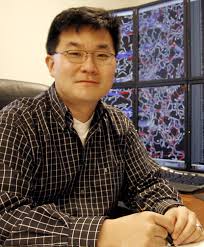iNANO Annual Meeting: Using Computational Molecular Modeling as a Predictive Tool: Sucesses and Challenges of a Collaboration between Theory and Experiment
Professor Mu-Hyun Baik | Department of Chemistry, KAIST, Korea
Info about event
Time
Location
iNANO AUD (1593-012), Gustav Wieds Vej 14, 8000 Aarhus C

Using Computational Molecular Modeling as a Predictive Tool: Sucesses and Challenges of a Collaboration between Theory and Experiment
Computers have recently become an important tool of scientific inquiry in chemical research. In addition to the traditional use of computer models for explaining what experimentalists observe, the most promising potential in using computer models lies in making predictions. Instead of going through laborious experimental endeavors riddled with technical difficulties and the commitment of much time and effort, it is tempting to construct computer models that are often much easier to scale. It appears that software, hardware and knowledge base in computational molecular modeling are all ready to a serious test in using computers to lead and not only follow experiments. In this presentation, I will share our own experiences in trying to use computers for predictive chemical research and highlight some successes and failures.
Autobiography: Mookie (Mu-Hyun) Baik was born in Seoul, South Korea. After spending the first 10 years of his life in the Metropolitan city of Seoul, he moved with his family to the Western part of Germany near Düsseldorf, where he grew up and completed his undergraduate education in chemistry at the Univ. of Düsseldorf in 1994. Then he moved to the USA for his graduate work, completing his Ph.D. in 2000 under the supervision of Prof. Cindy Schauer in the Chemistry Department of the Univ. of North Carolina in Chapel Hill, specializing in computational inorganic chemistry. His postdoctoral training was completed under Prof. Rich Friesner at Columbia Univ. in New York City. In 2003, he started his independent academic career as an Assistant Prof. of Chemistry at Indiana University in Bloomington. Mookie received tenure and was promoted to Associate Prof. in 2008. In 2015, he was called back to his original home land by the Korea Advanced Institute of Science and Technology to assume the position of a Full Professor of Chemistry and at the same time to serve as an Associate Director of the Institute for Basic Science (IBS) - Center for Catalytic Hydrocarbon Functionalizations. The IBS is the Korean version of the German Max Planck Institutes. Mookie has won several Awards for his work in computational molecular modeling over the years, including the Sloan Fellowship, the NSF CAREER Award and the Cottrell Award. He has published around 130 original research papers, of which around 70 have appeared in very competitive journals such as J. Am. Chem. Soc., Science, Nature Chemistry and Angewandte Chemie.
